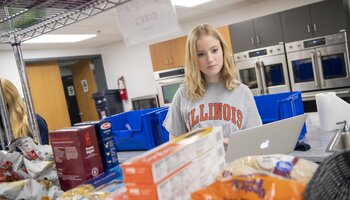Sharon M. Donovan, Ph.D., R.D.
Professor and Melissa M. Noel Endowed Chair in Nutrition and Health / Director of the Personalized Nutrition Initiative
Dr. Donovan received her B.S. and Ph.D. in Nutrition at the University of California at Davis in 1983 and 1988, respectively. After completing a post-doctoral fellowship in Pediatric Endocrinology at the Stanford University School of Medicine, she joined the faculty at UIUC in February 1991 as an Assistant Professor of Nutrition. She was promoted to Associate Professor with indefinite tenure and to Full Professor in August 1997 and August 2001, respectively. She served as Director of the Division of Nutritional Sciences between 1999 and 2009. Dr. Donovan teaches both basic and advanced nutrition classes and has been included on the "List of Teachers Ranked as Excellent by their Students" more than 25 times for 9 different courses.
Dr. Donovan has ~ 225 peer-reviewed publications and book chapters and receives grant support from the National Institutes of Health (NIH), the United States Department of Agriculture (USDA), foundations and the food and pharmaceutical industry. Her research efforts have been recognized by both national and international organizations with several awards, and her graduate students have been the recipients of prestigious fellowships, scholarships and awards for their research accomplishments. She served as President of the American Society for Nutrition for 2011-2012 and served as the President of the International Society for Research on Human Milk and Lactation (ISRHML) for 2018-2020.







